Atalanta’s Gian Piero Gasperini: ‘We used to call Ilicic ‘Josip the Grandma” | Football
Gian Piero Gasperini is getting animated. Atalanta’s manager is talking about how he motivates players. He describes how he often puts up messages in the changing room and one of the most recent, he says, was from Michael Jordan: “Twenty-six times, I have been trusted with the final shot and I missed. I’ve failed over and over and over again in my life. And this is why I succeed.”
Gasperini pauses and says: “But the best one is about the wolf pack.” The wolf pack? “I posted a picture of a wolf pack in the changing room. There are wolves at the front, some in the middle and one at the back. The ones up front can set the pace in the beginning. The next wolves are the strongest, they are the ones who must protect everyone if they are attacked. The ones in the centre are always protected.
“Then there are another five strong ones further back to protect an attack from there. The last one is the boss and he ensures no one is left behind. He keeps everyone united and is always prepared to run everywhere; to protect the whole group. The message is that a leader doesn’t just stay up front; he takes care of the team and this is what I want from my players.”
It is an unusual message to send a group of highly-paid professionals but it is working. What Gasperini wants from his players, he gets. Before coronavirus struck, Atalanta were having the best season in their 113-year-old history. They are one of four teams through to the Champions League quarter-finals – with Paris Saint-Germain, RB Leipzig and Atlético Madrid – and on course to qualify for next season’s competition.
Then there are the goals. They have scored the most in Italy since the start of last season. This campaign there have been 70 in 25 league games. Three times they have scored seven – against Udinese, Torino and Lecce. Two of those games were away. Milan and Parma were beaten 5-0.
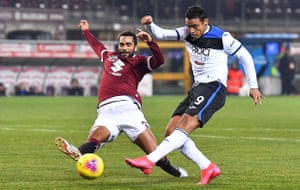
Atalanta are, simply put, one of the most entertaining teams in the world. How has Gasperini done it? “To give you an idea I will use a Chinese proverb from 500 BC [from the Art of War]: ‘Defending makes you invincible, but if you want to win, you must attack.’ This sums up the spirit and mentality I want my team to have. But there’s something else that is important too: the identity you create in a team must always be reinforced. You must grow and improve, day by day, because if you do not improve, you are done. Those who stop, they have lost.”
Gasperini is relentless in his demands, not unlike Jürgen Klopp. Training is merciless and some players have not enjoyed it. Christian Vieri once said that Gasperini “will destroy you in training” but Atalanta’s manager says: “During training, my players need to struggle; those who aren’t used to working hard scare me. But from the struggle, victories are born. If you don’t run in training then you don’t run during the game. Then, of course it is important to have fun in training too because from that comes the style of play and the quality.”
Gasperini has created a remarkable team from an unusual set of players. The captain is the remarkable Papu Gómez, a 32-year-old Argentinian who joined from Metalist Kharkiv for £4m in 2014. Another key forward, Josip Ilicic, is also 32 and arrived from Fiorentina for £5m in 2017.
The former Aston Villa goalkeeper Pierluigi Gollini, former Middlesbrough midfielder Marten de Roon and Mario Pasalic, a Croat who belongs to Chelsea but has found a home in Bergamo on his fifth loan away from the London club since joining in 2014, are other key components. Robin Gosens arrived from Eredivisie side Heracles for less than £1m, yet is one of Europe’s most sought-after left-backs now while Bergamo-born Mattia Caldara is back at Atalanta after spells at Juventus and Milan and has been outstanding at centre-back.
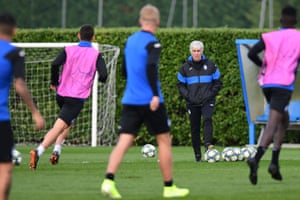
These players are in the best form of their lives, but why? “There is a secret,” the 62-year-old Gasperini says. “When you reach the maturity necessary to understand that hard work leads to results, you no longer feel tired. Let’s not lose track of the fact that footballers don’t train as hard as other athletes, where the training is tough and intense. My players must think of that and go at it harder. We never had the means for big investments, so we had to find young players in Europe with the same philosophy: able to adapt to our style of play, winning mentality, offensive-minded and willing to work hard. Those who believe in that is one of us, those who are afraid leave.”
Gómez once said Gasperini trains players so hard that a match feels like a day off. “With Papu we are talking about an extraordinary player who had not achieved his potential because he never trained well,” Gasperini says. “When he started training better he raised his level to become one of the best in Europe. He wasted time because training makes you into a champion: he always had everything to become one.
“Ilicic is another one. We used to call him ‘Josip the Grandma’ because he was just going around being nice to everyone. We had to convince him to increase his efforts at training. He was missing that mental step but once he changed his mindset we stopped calling him grandma, now we call him ‘The Professor’. He realised that every training session is fun and from that decision he was reborn. Five goals in the Champions League this season is a superb effort.”
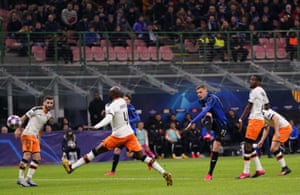
Life has not always been straightforward for Gasperini. After a decent playing career, which started at Juventus’ youth teams and included 59 Serie A appearances for Pescara, he joined Juve’s coaching setup, looking after their under-14s, under-17s and the Primavera squads (under-20s). Successful spells at Genoa earned him the nickname “Gasperson” with a nod to Sir Alex Ferguson because of the team’s style.
However, in 2011, when given his chance at a big club, Inter, it went horribly wrong. He lasted less than three months, having failed to win a game, sacked after a demoralising defeat by promoted Novara. As fate would have it though, his dismissal led to one of his favourite moments in football.
“I had just been sacked at Inter because I didn’t have the same vision as the management. Then I received a beautiful message: Pep Guardiola wanted to meet me and he invited me to watch his training sessions at Barcelona. It was a very tough moment in my career and to see how an extraordinary manager like Guardiola stayed close to me at that time, it tells you the type of person he is. He made me very happy.”
Even at Atalanta, Gasperini initially had problems. At the start of the 2016-17 season the newly appointed manager lost four of his first five league games. There was again talk of the sack when he threw caution to the wind and gave several young players a chance against Napoli, one of the best teams at the time. Atalanta won 1-0 and have not looked back.
“I decided to go down this path,” he says. “I’ll make it until the end with my ideas; I’m ready to risk everything because I believe in it. We started Mattia Caldara, Roberto Gagliardini, Andrea Petagna and Andrea Conti and other young players with only a few Serie A games between them. We won with a fantastic performance that no one forgets about since that was the beginning of the growth. The beginning for the historical Atalanta way.
“I had the idea to play youngsters right away. In Italy, Bergamo is considered a very important place for work, industry and productivity. I wanted to have a project tied to young players, preferably raised in the Atalanta academy, which is exceptional. For too long the backbone of the team was too old so I tried to avoid relegation with a different method: to have full confidence in the young players, develop them and prioritise quality football.”
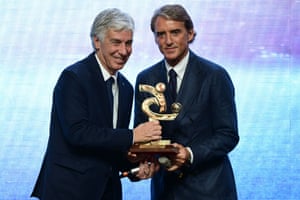
Tactically, Gasperini rarely deviates from 3-5-2/3-4-3, although there is a lot more positional rotation now. His high-pressing game is unusual for the Italian league. He wants players to look for space and has even told them that watching the referee can help: “Finding space is fundamental for a player so I told them: ‘Look at the referee, he’s never being marked, he’s always in an ideal position to see the game!’ Papu, in particular, has taken on this advice and it has really helped him.”
His wife, Cristina, has said that he sometimes wakes in the night and grabs his computers and starts writing notes. “Yes,” he says and laughs. “With my computer at night or with my blackboard I’m always studying for solutions for the next game and only when I believe they will work will we start training.”
In Italy, Gasperini has always been seen as the man with the three centre-backs. It has almost defined him. He has been criticised by some for sticking by tactics associated with catenaccio. “I’m proud of this, because I suggested the three-man defence many years ago when I was coaching in Juventus’ youth system. Back then I was told it was too defensive. I proved it was the opposite: the three defenders participate in the run of play, they are trained to be involved offensively.
“The formation doesn’t matter, but rather with how many players do you attack or defend. If I had to sum up my defensive philosophy in one phrase it would be that I don’t believe and I will never believe in the concept of waiting for your opponent to make a mistake: I think you must try to steal the ball to attack.”
Atalanta finished fourth in 2016-17, seventh the following campaign and third last season to qualify for the Champions League group stage. They started by losing 4-0 at Dinamo Zagreb, 2-1 at home to Shakhtar Donetsk and 5-1 at Manchester City but reached the last 16 by drawing against Manchester City and winning their two remaining games. “I always tell my players: we never lose, we either win or learn,” Gasperini says.
Guardiola has said playing against Gasperini’s Atalanta is like “going to the dentist”. The Italian approves: “That is my objective: create a team that would make any opponent struggle. Those who play against us must run a lot and be bothered. I think the dentist metaphor, it is perfect.”
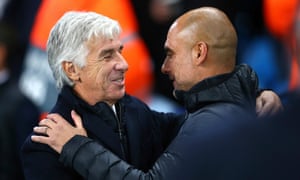
Valencia were vanquished 8-4 on aggregate in the Champions League last 16. And then everything stopped. Gasperini remembers returning to Bergamo from the second leg in Spain. “It felt like we were in a country torn apart by war. Everything happened so quickly: just a few days before there was no feeling of what could happen. I remember when we arrived in Valencia, we found a city filled with people celebrating in the streets or outside the stadium, while in Bergamo there were the first indications the situation was critical. When we came back to Bergamo we realised how much had changed in just two days. We went from euphoria to fear in the span of 48 hours.”
Gasperini is struggling to find the words to describe the past two months in Bergamo. “This has been something extraordinary, unexplainable with words. Bergamo has been at the centre of this awful coronavirus. It hit our city deeply and caused so many deaths … I’ll never forget the sirens we heard in the centre of Bergamo for the rest of my life.”
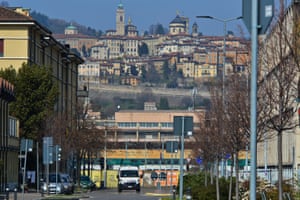
When matches resume Gasperini knows what he will tell his team. “I will put the emotional aspect right, front and centre. These players have a great bond with Bergamo: the city and the fans. I will talk emotionally and my sentiment will be this: Bergamo suffered a lot, this is our moment to make them smile again.”



